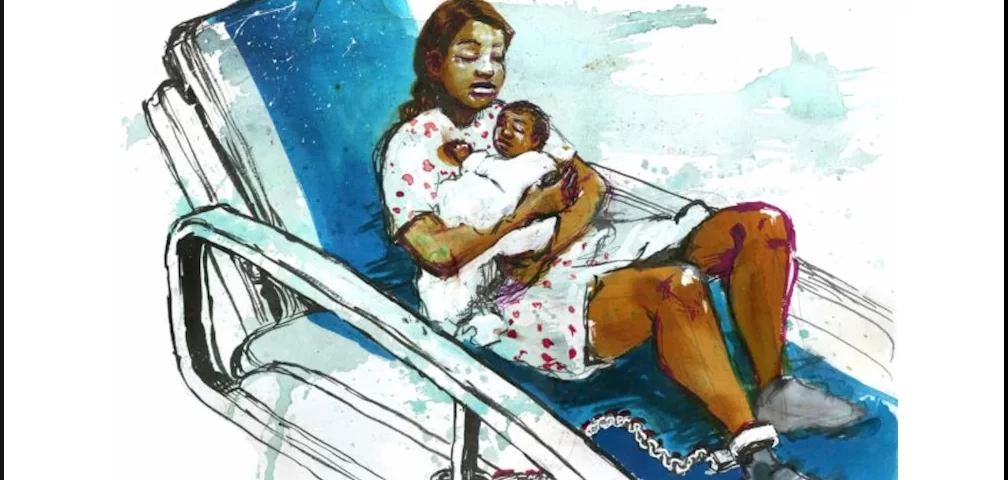by Marie Kelly, published on Workers World, July 8, 2022
The Supreme Court ruling against reproductive rights guaranteed for 50 years in the SCOTUS Roe v. Wade decision has had dramatic and devastating consequences for anyone who can get pregnant but is trapped in the U.S. carceral system.
Number of incarcerated women accelerating
According to the Prison Policy Initiative, the incarceration rate of women in the U.S. has grown at twice the pace of men over the past 40 years. There has been a startling 475% increase in women incarcerated. The majority of women (60%) are awaiting trial and have not been convicted of any crime. (Dec. 8, 2021, prisonpolicy.org/blog)
Strict drug laws may account for some of the increase in the population of women in prisons. The crackdown on immigrants means Immigration and Customs Enforcement agents often detain immigrants in local jails. More girls than boys are held in youth detention centers for truancy and running away from home — often a desperate attempt to escape an abuser.
What is the fate of these people, now that the federal government has abandoned any commitment to reproductive freedom for the working class?
Prisoners subject to local and state laws
Those incarcerated in local jails and state prisons are subject to local and state laws.
At last count, 29 states have laws banning abortion. Many of these states, like Texas and Oklahoma, have seen the highest increase in the number of incarcerated women. Even for nonincarcerated people, access to abortion in these states will require travel across state lines and cash — insurmountable barriers for many poor workers, especially in Black, Brown and Indigenous communities.
For the large population of women on parole or probation, traveling out of state for an abortion poses a real threat of being sent back to prison.
Options are harsher for people arrested while pregnant, who will be forced to carry an unwanted pregnancy. Depending on state law, there is little to no option for an abortion if the person is sent to prison in a state with anti-abortion laws.
Carceral conditions dangerous for pregnancy
Incarcerated people who are pregnant represent about 4% of the total population in women’s prisons across the U.S. They are at the mercy of a carceral system that does very little to guarantee prenatal care, proper nutrition and safety from complications due to pregnancy.
In fact, the health care in prisons is dangerously inadequate. Incarcerated people are exposed to toxins in their environments, threat of sexual abuse, risk of physical injury and severe mental distress.
Pregnant individuals need good food, plenty of exercise and proper rest. They need education about childbirth. None of these necessities are a priority in the current carceral institutions.
Workers World has reported that incarcerated women and their families in Georgia’s Pulaski State Prison “described extortion, sexual assault and physical and emotional violence, plus the inhumane living conditions of moldy food, unsanitary cells, callous guards and lack of medical care, which are all fairly standard throughout the Georgia system.” (tinyurl.com/8rtsmje9)
Giving birth while incarcerated
Childbirth is never easy, but most women have the support of family members and medical professionals. Pregnant people who are incarcerated have either the bare minimum of care or, in a worst case scenario, are totally alone in a cell when they are giving birth.
Erica Thompson is a Black woman who was held in a Florida jail in 2021 for driving with a suspended license. Guards ignored her cries for help when she went into labor and gave birth. Her baby, Ava Daniels, died at a local hospital due to complications that medical personnel said would have been preventable if she had been delivered at a hospital. (Daily Kos, Oct. 24, 2021)
Pregnant people who are transported to a hospital from prison are still being shackled, even when there are laws on the books restricting the practice. Following birth, many mothers are transported back to prison without their newborns. This cruel separation can have profound negative implications on newborn development and exacerbate postpartum depression for the new mom.
Abolish prisons now!
In 1970, prior to the 1973 Roe ruling, Shirley Wheeler was convicted of manslaughter after an illegal abortion. More recently, with the far-right direction of the Supreme Court, the anti-abortion war on pregnant people has gained momentum.
In April, only after enormous pressure from pro-choice activists, state of Texas murder charges were dropped for Lizelle Herrera. She was charged after an alleged self-induced abortion. There was, in fact, no law on the books at the time for which she could legally have been arrested or charged with a crime. (workers.org/2022/04/63287/)
Now is the time for prison abolition. It is critical for the fight for reproductive freedom and justice.
*Featured Image: Shackling of pregnant incarcerated people, artist: Molly Crabapple
